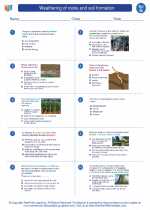Genetic Variation
Genetic variation refers to the differences in DNA sequences among individuals within a population. It is a fundamental concept in genetics and plays a crucial role in evolution and the adaptation of species to changing environments.
Sources of Genetic Variation
Genetic variation can arise from several sources:
- Mutations: These are changes in the DNA sequence that can occur spontaneously or be induced by external factors such as radiation or chemicals.
- Sexual reproduction: The process of meiosis and fertilization leads to the shuffling and recombination of genetic material, producing offspring with unique combinations of genes.
- Gene flow: The movement of individuals and their genes between populations can introduce new alleles and genetic diversity.
- Genetic drift: Random changes in allele frequencies within a population, especially in small populations, can lead to genetic variation.
Importance of Genetic Variation
Genetic variation is vital for the survival and evolution of species for several reasons:
- It provides the raw material for natural selection, allowing populations to adapt to changing environmental conditions.
- It increases the likelihood of some individuals having traits that are advantageous for survival and reproduction.
- It contributes to the overall health and resilience of populations by reducing the risk of genetic diseases and susceptibility to pathogens.
Study Guide
To understand genetic variation, it is important to grasp the following key points:
- Define genetic variation and explain its significance in the context of evolution and adaptation.
- Describe the different sources of genetic variation, including mutations, sexual reproduction, gene flow, and genetic drift.
- Discuss how genetic variation contributes to the overall health and resilience of populations.
- Explore examples of genetic variation in different organisms and the impact on their survival and adaptation.
Understanding genetic variation is essential for comprehending the mechanisms of evolution and the diversity of life on Earth.
[Genetic Variation] Related Worksheets and Study Guides:
.◂Science Worksheets and Study Guides Seventh Grade. Weathering of rocks and soil formation
Study Guide Weathering of rocks and soil formation
Weathering of rocks and soil formation  Activity Lesson
Activity Lesson Weathering of Rocks
Weathering of Rocks  Worksheet/Answer key
Worksheet/Answer key Weathering of rocks and soil formation
Weathering of rocks and soil formation  Worksheet/Answer key
Worksheet/Answer key Weathering of rocks and soil formation
Weathering of rocks and soil formation  Worksheet/Answer key
Worksheet/Answer key Weathering of rocks and soil formation
Weathering of rocks and soil formation  Worksheet/Answer key
Worksheet/Answer key Weathering of rocks and soil formation
Weathering of rocks and soil formation  Vocabulary/Answer key
Vocabulary/Answer key Weathering of rocks and soil formation
Weathering of rocks and soil formation  Vocabulary/Answer key
Vocabulary/Answer key Weathering of rocks and soil formation
Weathering of rocks and soil formation  Vocabulary/Answer key
Vocabulary/Answer key Weathering of rocks and soil formation
Weathering of rocks and soil formation  Vocabulary/Answer key
Vocabulary/Answer key Weathering of rocks and soil formation
Weathering of rocks and soil formation 

 Activity Lesson
Activity Lesson
 Worksheet/Answer key
Worksheet/Answer key
 Worksheet/Answer key
Worksheet/Answer key
 Worksheet/Answer key
Worksheet/Answer key
 Worksheet/Answer key
Worksheet/Answer key
 Vocabulary/Answer key
Vocabulary/Answer key
 Vocabulary/Answer key
Vocabulary/Answer key
 Vocabulary/Answer key
Vocabulary/Answer key
 Vocabulary/Answer key
Vocabulary/Answer key

The resources above cover the following skills:
LIFE SCIENCE
Unity and Diversity
Analyze and interpret data for patterns of change in anatomical structures of organisms using the fossil record and the chronological order of fossil appearance in rock layers.